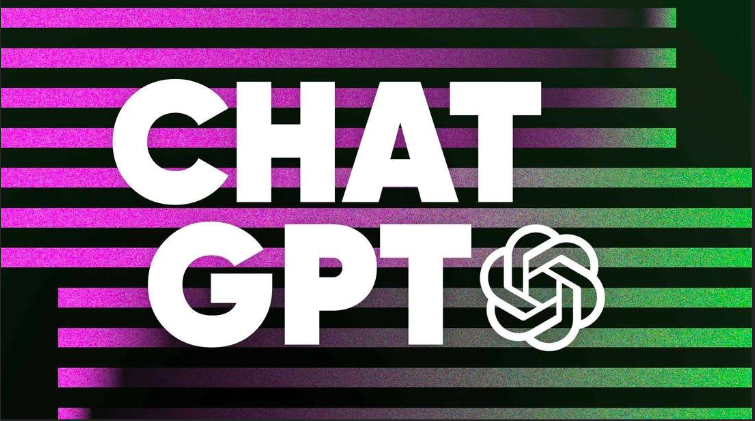In this blog article, we’ll look into ChatGPT an AI-powered assistant, and its features and capabilities, which make it a must-have tool for anyone working in cybersecurity.

Introduction to ChatGPT:
The Chat GPT (Generative Pretrained Transformer) technology is capable of automating different tasks by utilizing its advanced language processing abilities. As a result, it can significantly enhance the effectiveness of these processes, ultimately saving time and resources.
To access the features of ChatGPT, you can create a free account on the platform. Visit the URL “https://chat.openai.com/chat” to access ChatGPT.

ChatGPT for Penetration Testers or Bug Bounty Hunters :
The application of Chat Generative Pretrained Transformer (GPT) technology can prove beneficial to penetration testers and bug bounty hunters. Specifically, Chat GPT enables automation of the process of detecting vulnerabilities in software or websites. Chat GPT comprehends the provided instructions and executes appropriate actions such as checking for known vulnerabilities or attempting to exploit an implicit vulnerability. Moreover, it aids in analysing and categorizing security test results, thereby saving time and effort for penetration testers. Chat GPT is a valuable resource for individuals working in the field of Pen testing and cybersecurity bug hunting.
ChatGPT Capabilities :
ChatGPT has been impressed by its features. I have found it useful for automating testing processes, writing scripts, generating reports, and many more.
- Vulnerability detection in code.
- Custom Payload Generation.
- Burp suite extension through ChatGPT.
- Creating Custom nuclei templates.
- Generating Bug Bounty Report.
Vulnerability Detection in code:
ChatGPT assists in identifying weaknesses within a code or script and provides an in-depth explanation. For example, I used simple python code with flaws and checked it using ChatGPT to identify vulnerabilities in my code. ChatGPT produced precise and explicit results, along with recommendations on how to construct a secure code.

Custom Payload Generation:
By utilizing ChatGPT, it is possible to create customized payloads to meet our specific requirements. For example, I made to create a payload capable of circumventing a web application firewall (WAF).
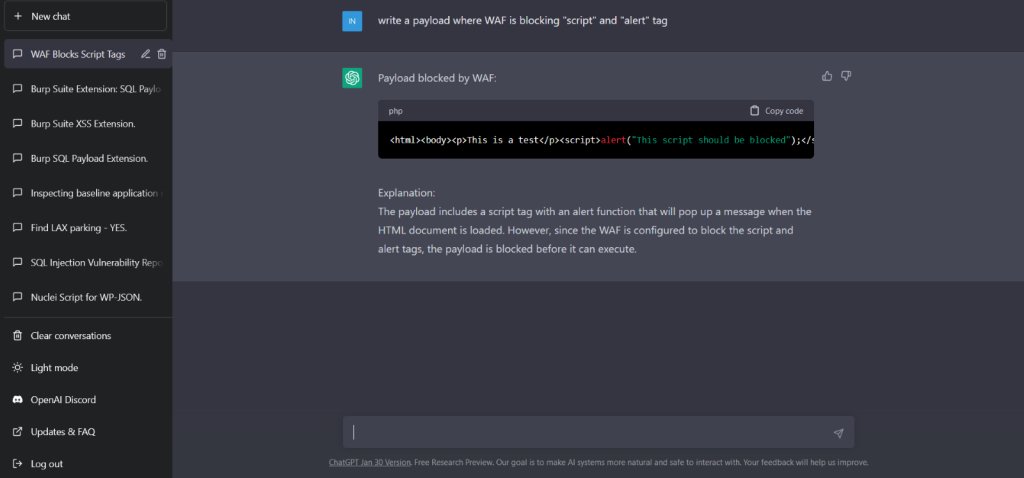
Burp Suite Extension Creation through ChatGPT:
Using its code generation capabilities, It can produce a Burp extension, typically coded in Java, which can be utilized by cybersecurity professionals in an ethical manner. As an illustration, a Burp Suite extension was developed to insert SQL payloads to all parameters automatically.
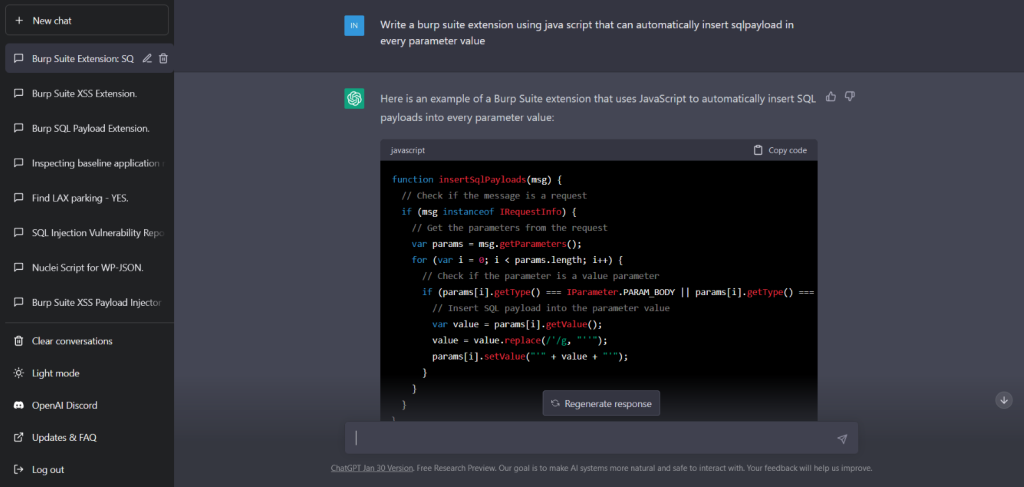
Creating Custom Nuclei Templates:
ChatGPT is a user-friendly tool that assists in crafting nuclei templates to cater to particular needs. To illustrate, I endeavored to generate a nuclei template aimed at extracting details about an anticipated response by scrutinizing a baseline application request. Such a template would be beneficial to individuals seeking to uncover possible security loopholes.
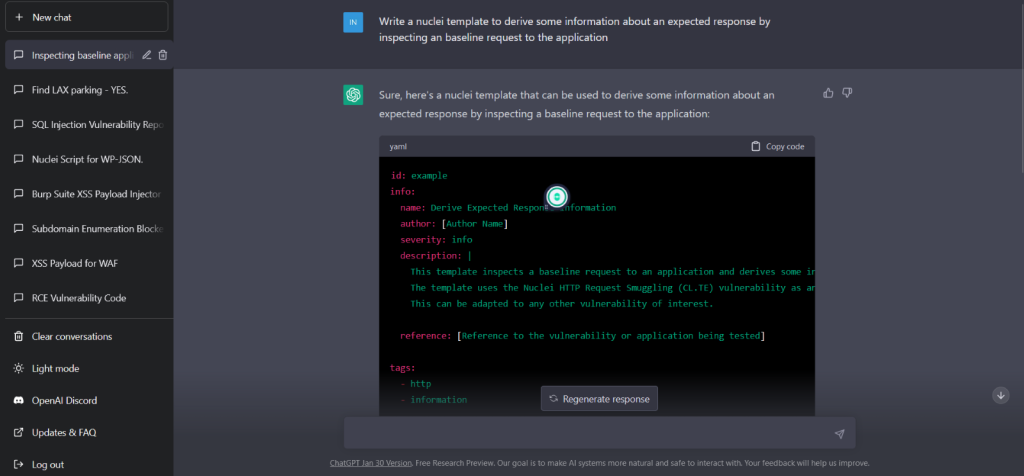
Generating Bug Bounty Report :
Chat GPT has the feature of generating reports on the results of the security test, with all the details on any vulnerabilities that were found, and adds recommendations for remediation. For example, here I have tried to write a bug bounty report for an application that I mentioned to have a Reflected XSS vulnerability. It provided me with the results, including the Title, Vulnerability Description, Location, Impact, Steps to Reproduce, and Recommendations.
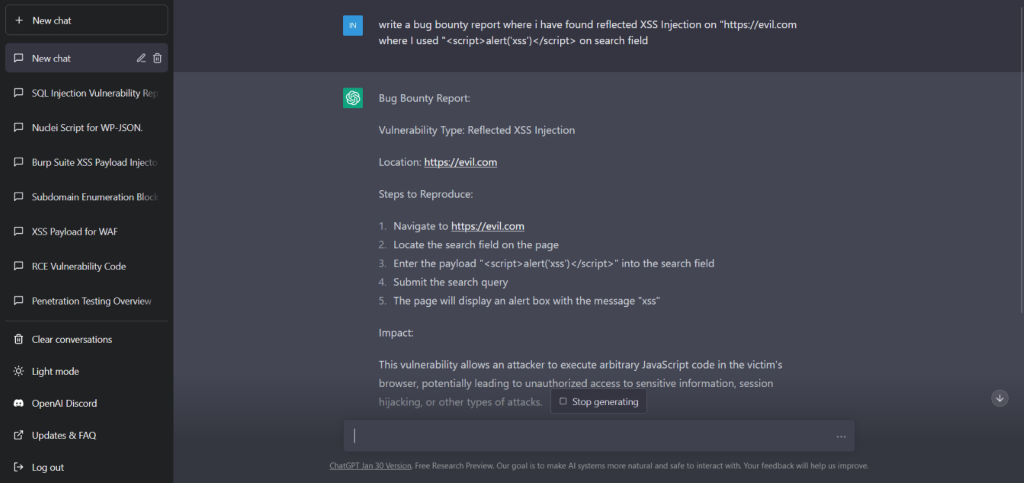
References:
Privacy error (securitycipher.com)
The Power of ChatGPT for Penetration Testing (securelayer7.net)
For further clarifications or support, please write to contact@paradigmitcyber.com
